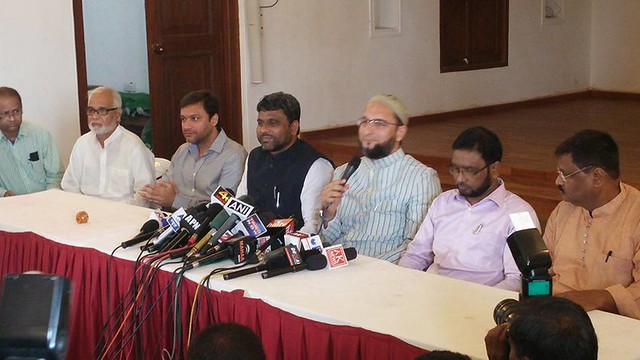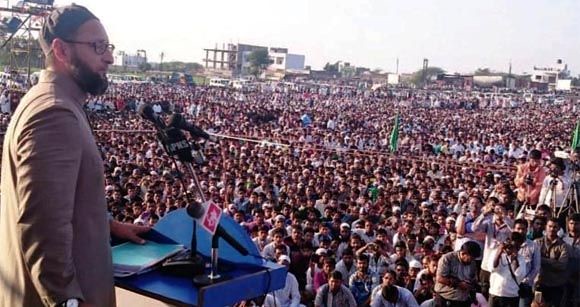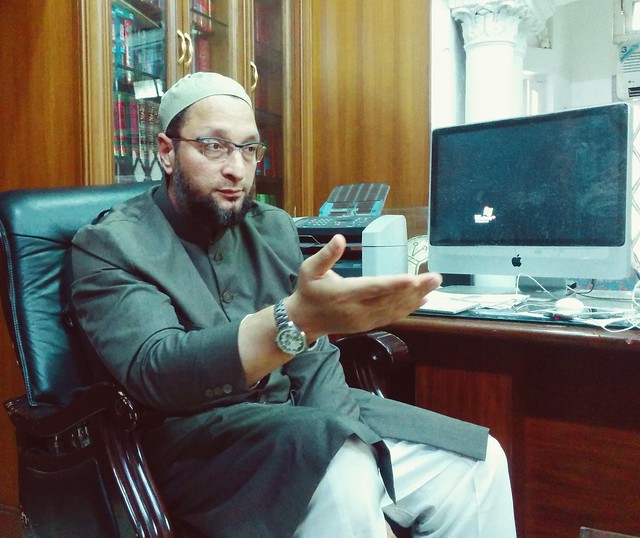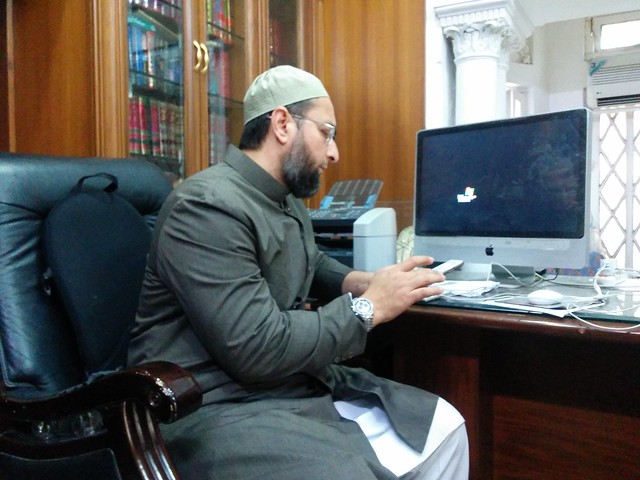Muslims and Dalits must come together on social issues and political understanding will follow, MIM President tells TCN in an Exclusive Interview.
Ever since the Lok Sabha election last year and the regime change at the Centre, the seven stars of the flag of All India Majlis Ittehadul Muslilmeen (AIMIM), led by Asaduddin Owaisi, have been on the rise. With the high ambition of becoming the ‘national’ party for Muslims and other marginalised communities, MIM is gradually expanding its base beyond the Deccan.
TwoCircles.net Assistant Editor, M Reyaz caught up with AIMIM President Asaduddin Owaisi to understand his party’s legacies in Hyderabad, its achievements and shortcomings, and the plan for the future.
TCN: Majlis Ittehadul Muslilmeen was created in a different time and for different kind of politics. How ably do you think you have been able to take the party forward?
Asaduddin Owaisi: For a political party to remain relevant it has to ensure that the present days’ challenges and objectives are met; and that is why a political party remains relevant; people’s hopes and aspirations are different from what they were in 60s or 70s and 80s or 90s. That is why, we try to reflect the hopes and aspirations of the people. And I don’t feel that we did something extraordinary (in that) because every political party does it.
With time certain challenges are always there, will remain and the aims and objectives and expansion has to be there.
TCN: But how successful do you think you have been as a leader in all this?
AO: I cannot measure how successful I am, but one thing I can say that I am trying my best with all sincerity and have always asked Allah to help me; that is the best I can do.
TCN: As you plan to go expand beyond Deccan, what legacies would you want to showcase?
AO: (Jokes) Do you want me to die early? I don’t know….
TCN: I mean what are the achievements of your party to showcase to the people, particularly in the north?
AO: Individually I have no role to play in whatever success MIM has achieved or will achieve in future InshaAllah. This is all the hard work done by then party elders fifty-sixty years ago; and they had really done hard work at that time. And that is why whatever little success we have achieved is because of Allah’s mercy and those party elders’ hard work…If we can expand our party that will be good, that will be better…
TCN: When it comes to identity assertion, Majlis no doubt has helped them (Muslims) give voice and representation, but when we see around, say for example, last year Kishanbagh riots to the recent custodial encounter killing in Aler, is the situation of Muslims in Hyderabad really different from other parts of the country?
AO: When the Kishanbagh incident happened, we were able to control the situation and ensure that it does not get out of hand because communal riots had taken place there, if I am not wrong in 2000 as well. That was totally uncalled for, unprovoked police firing. We had made representation to the government and the lawyers also filed a case.
About Aler, you know, there have been protest meetings throughout Andhra Pradesh under the umbrella of Mushtarika Majlis-e-Amal under Abdur Rahim Qureshi Sahib. We have called the people, exposed the police high handedness; and people who feel that Aler is forgotten are completely wrong. You see people memories are not (short)…people will not forget Aler. And verdict will be given by people against the government if they don’t do justice to the victims of Aler. They were facing criminal cases and the judgement would have come by now…so this was a high headed behaviour.
We have also filed a case in the High Court which is taking some time, but I am sure that once it is heard in the AP High Court there will be forward movement in that.

MIM Press Conference announcing decision to participate in Bihar Assembly Election.
TCN: Your critics say, you raise issues but they are limited to rhetoric, and you hardly follow them or lead them to logical conclusion?
AO: They should give me examples of such things then I can say whether they are right or wrong. If I have done such thing, I will be the first person to say OK I have done it, but they must give me specific example instead of making a wild allegation. So I cannot really substantiate on that; if they give specific examples of wherein I have not followed it up by the word then…
TCN: Like say Kishanbagh riots, six-seven people died and…
AO: Kishanbagh riot was followed up and for the first time the Ministry of Home Affairs guidelines were implemented in terms of ex-gratia. Though ex-gratia cannot bring back the life of those people who have been killed. But we went and met the Governor because at that time the elections were over but the elected government had not taken control. So the Governor was still running the state. And the cases are still pending so that does not mean that we don’t follow it up, we definitely followed it up.
TCN: Leave out security; even in matters where Muslim leadership should have some control, for example the conditions of Waqf properties; we don’t see much difference in Hyderabad from other parts?
AO: You are absolutely wrong. Show one state wherein Waqf properties which were encroached upon by the government have been returned back to the Waqf Board? It is because of MIM’s constant representation and pressure that nearly 55 acres of land near the airport under Dargah of Baba Sharfuddin RA was returned back by the then administration of late YS Rajashekar Reddy; that land is still vacant you can see for yourself.
The task force office where police task force has encroached upon waqf property on green lands, we got it vacated. Now government without following proper procedure has given the land for road widening.
Akbar (Owaisi) as an MLA has filed cases in the High Court for many waqf properties, in the then state of Andhra Pradesh; at Vizag we filed a case for Ishaaq Shah Madani RA Dargah…
So it is completely wrong to say MIM has not fought for or protected the waqf properties. It is a baseless allegation in fact I challenge people to show wherein we have…these are clear cut examples to show what MIM has done and continue to do to protect the waqf properties.
TCN: Do you think in this era when NaMo politics has rendered Muslim votes almost irrelevant, MIM’s political prospect is rising through counter-polarisation?
AO: this is a democracy, and a participative form of democracy in a heterogeneous country like India you require more voices; what is wrong in that?
And counter polarisation, where the question of it, there is already polarisation of so called upper caste majority community. The weaker sections like Dalits and Muslims always stood by secular voices and secular parties. Now this is for this majority upper caste community to showcase how secular they are. And you gave reference of north India, see Uttar Pradesh; in the history of India for the first time there is not a single Muslim MP from UP. So who is responsible for that? And why is that the political parties who claim to be secular and who call me polarising figure – I agree with their allegation for a while (for the sake of argument) – but what have they done to ensure that Muslims get elected.
Muzaffarnagar riots have happened; you have this classic case of 10 Muslim women who went to the Supreme Court, who were raped. (TCN Note: though many women were raped in 2013 Muzaffarnagar riots, it’s not 10 but seven women who went to the SC). The Supreme Court told the State Government to pursue that matter, give them security and file charge sheet within a year; nothing has happened so far, two years have passed since the Muzaffarnagar (riots) happened.
So these are the things which these parties should understand. I am sick and tired of these that we should help the secular parties; at what cost? It cannot be one way traffic…

Asaduddin Owaisi’s August 16 public rally in Kishanganj
TCN: You often say, Muslims are not coolies of secularism…
AO: Yes, we are not…and see this is a burden which these political parties have imposed on us, on our weak shoulders. And I don’t think that the present day Muslims are willing to carry this burden of secularism; alone we cannot carry. Let this burden, this responsibility be shared by everyone; it cannot happen that I share the burden and you get the benefits of me sharing the burden.
TCN: In context to counter-polarisation, right from Maharashtra to Bihar, often there has been allegation that is some sort of understanding with the BJP. Digvijay Singh has alleged it, some others too…
AO: Digvijay Singh has made that baseless allegation and I have sent him notice through my lawyer and if he does not apologise then we will definitely file defamation case against him.
TCN: So you completely deny this?
AO: Where is the proof? The proof (instead) is on the other side; that is, I did not contest the Maharashtra Parliamentary elections; Shiv Sena-BJP won 42 seats, was there some sort of hidden understanding between secular parties and BJP? Modi got 280 parliamentary seats, was there some sort of understanding?
I did not contest Delhi which they lost. Jharkhand, Haryana, Jammu and Kashmir, I did not contest, still BJP won. I did not contest in Madhya Pradesh, Rajasthan municipal elections, BJP won.
What right these people have got to blame me? In Bihar, Left parties are contesting on a different platform, why isn’t this question asked to them? Why is this question being asked to the Samajwadi Party whose topmost leader shared the dais with the three important leaders of the Congress, JDU and RJD (but now contesting elections separately?)
This clearly shows that they are insecure; what I am saying is exposing them badly and so they have stopped down so low in making baseless allegations against me. When I was in the UPA, for eight years, I was the holy cow. Because now we are not supporting them and opposing them for rightful reasons for political empowerment of Muslims, for justice for Muslims; that is why they don’t like it.
TCN: From Maharashtra Assembly elections to recent Bangalore municipal elections, MIM had mixed results. How do you assess your prospects from here?
AO: We have to fight elections, we are a political party, we are not an NGO. So we win elections (and sometimes) we will not win elections, that is the beauty of democracy.
But until and unless you fight elections, how would you convey your message. And you talked about Bengaluru municipal elections, yes, I accept the verdict; but one must also see the highhanded behaviour of the Congress Government over there. I was not even allowed to hold a single public meeting, despite being a registered party in the Karnataka Election Commission. I was not even allowed to do a single Padyatra on any of the wards. In fact the hotel, where I was staying, he was threatened; I took a furnished flat, that person was threatened.
I wanted to hoist the national flag on August 15, the police stopped me saying, I must take the necessary permission…These are all highhanded, dictatorial steps which were taken.
Once the Assembly elections are announced, I challenge the Congress party to stop me in this way which they have done during the Bengaluru municipal elections because the Election Commission will be there; they will not tolerate all this nonsense. The elections will be, I am sure, free and fair and political parties can contest so let us wait, the story is yet to be said on Karnataka as far MIM is concerned. We will contest the Assembly elections and the strength of ours will be shown.
Of course when we are contesting, we lose some, but we have to contest; we cannot stop contesting elections because of the fear of losing. Once we lose that fear of losing, we will win. Late Kanshi Ram used to say, I like his quote very much: Pahla election haarna, dusra haraana, teesra jeetna (You contest first election to lose, second to defeat and third to win).
So as far as I am concerned, we want to contest elections and if not in my life time, maybe next generation or third generation will reap the benefits.
But you have to contest elections to ensure that people develop that mindset of getting out of this fear of these so called secular parties. Of course, we have to oppose communalism, we are totally opposed to the ideologies of the RSS and the BJP; but that does not mean that I should sit as some sort of a weeping boy or a scared small little girl; that cannot happen. We have to assert ourselves because democracy gives you that right of putting forward your views. And the best way is to participate in the elections.

TCN: In Karnataka and Maharashtra you worked on building grass root organisations, but we don’t see such efforts in North? Where are MIM’s regional units or leadership?
AO: No, no, that is completely wrong. In Uttar Pradesh, you should go and see and also in Kolkata, in West Bengal; even without any MLAs or myself going over there, public meetings which are being held over there are fantastic. We are getting good support over there.
Grass root level, yes organisation is being developed and you are right we will have to develop more leaders. Leaders are not going to fall from the sky or emerge from the ground; but they have to be developed, they have to be nurtured, they will have to be guided. And I am sure; this will happen InshaAllah (God willing).
TCN: So far MIM has largely remained an Owaisi-centric party, or are you open to forging alliance with other groups or leaders in north?
AO: (Gets little agitated) How is it Owaisi-centric party? This cannot be one man show, this is a collective effort of lakhs and thousands of people; and it’s often people whom I don’t even know them by their names. I don’t hold a magic wand; this is the result of lakhs and thousands of people who have worked days in and days out, who are still working, who are making duas (supplications), late in the night waking up and praying for MIM. So this is all collective effort, and collective leadership for whatever little success we have achieved. This cannot be and it will not be an individual centric or what you are saying, it’s not that…
TCN: Though known mainly as a party of Muslims, MIM is indulging in interesting politics of Jai Bheem, Jai Meem…recently a flyover in BR Ambedkar name was inaugurated in your constituency by Akbaruddin Owaisi. And it connects in a way, symbolically, one Muslim locality with a Dalit locality. Are you ready to forge alliance with some Dalit leaders in North as well?
AO: More than the political alliance, I am of the firm opinion that on social issues, Muslims and Dalits must come together that is very important. Issues concerning the Muslims and Dalits are exactly the same. In fact the empirical data on the backwardness of Muslims and Dalits are also the same. If you see, the dropout rate (from schools) among Muslims and Dalits start at the age 11. And from the age of 13, it becomes worse.
There is no much difference between them on unemployment ratio or even the kind of work which Muslims and Dalits do. The beef ban in Maharashtra has hurt both the communities. The Quraish biradari was doing the meat business, and the Dalits were doing the leather business. Both have been hurt badly.
I feel that if we come together on social issues, definitely a political understanding would be created; and only time will tell what can happen on political alliances, I cannot say on that as of now. But we are trying our best to ensure that Muslims and Dalits come together socially and politically.

TCN: There are rumours of some sort of alliance with the BSP?
AO: I don’t know from where these emerge, the elections are not in the near horizon. So when the elections will be held in 2017 that will be the right time to talk about this.
TCN: After your Kishanganj rally, in Bihar specially, among Muslims there is that fear that this will be counterproductive and will eventually help the BJP.
AO: Nitish Kumar was the Railway Minister when Godhra happened, he still continued with the BJP Government, he continued with the alliance in 2009 parliamentary elections. So Nitsh Kumar is fine with the BJP, Nitish Kumar is not fine with Modi. Asaduddin Owaisi is saying that there is no difference between Modi and BJP. They are same, in fact, there are more (likes of) Modis in the BJP and the RSS organisation.
Secondly, what is the minority budget in Bihar? Not Muslim, there has to be Minority Ministry; there are 18% Muslims and if you add Buddhists and Christians, it comes to about 19-20%. It is (budget) only near 299 crore. Now did I stop them from increasing the minority budget? What are the social indicators of Muslims in Bihar? I understand that the state has problems, but what about the weaker sections, the Muslims and Dalits. What is the representation of Muslims in government employment?
These are the questions that these people must answer. I am honoured, by blaming me for each and everything… but these are the questions, these are very pointed questions I am asking that they must answer. During Nitish tenure, Forbesganj police firing happened, what has happened? Why not a single protest meeting was held?
Now suddenly they talk all these issues; how did BJP win 30 parliamentary seats? Did I contest in Bihar? Why could not you stop them? And what happened in 15 years tenure of Lalu and Mrs Rabri Devi? What was improvement over there? How many Muslim MLAs are there (from Bihar)? How many Muslims candidates are given tickets?
So when these issues are raised, it is wrong to point finger at me because the four fingers are pointing at them.
TCN: Not just politicians, when I talk to Muslim intellectuals in Bihar…
AO: (interrupts) The politics which is done in Patna is same as Delhi, so the less we talk about all these intellectuals who are based in Patna…they should come out and answer these questions which I have put.
I know all these people, and the intellectuals who are sitting over there and talking in very good intellectual language, but do they have answers to these questions? They should answer these questions first and show their intellectual honesty.
TCN: I am asking a different question, these people say, that the issues they raise are pertinent issues, but in Hyderabad Majlis invested in social sector also, like say opening hospitals, colleges, etc. Does Muslim have similar plans? Are you planning to say start a branch of Owaisi Hospital?
AO: Majlis did not start all these institutes overnight; they came up after 20-25 years of political struggle. We started our party, the new MIM, which has no relations with the Razakars of that time in 1957; in 1984 we started our medical and engineering colleges. If we can do it over here, we can do it over there also; give me a chance because of these people have failed to do anything, I should get the opportunity of doing it.
But please understand that no one has a magic wand, it requires a political struggle, lot of hard work; and why not if it can be done over here, it can be done everywhere if we have sincerity and complete belief in Allah Subhanotalah this will definitely happen.
TCN: We spoke of Dalit leadership in Majlis, my last question, except for women reserved seats in corporations; we do not see any woman leaders in your party, as you plan to diversify are we going to see more women representation as well?
AO: Yes, that is true. I accept that there is need and requirement to have more women faces and that is why for the first time last year, we have established the women wing of the MIM party in Hyderabad; and we will do it as soon. You know, I cannot ignore the 50% of the population and expect that my party will expand. So definitely we trying our utmost to have more women faces. I accept that, definitely we will do.
